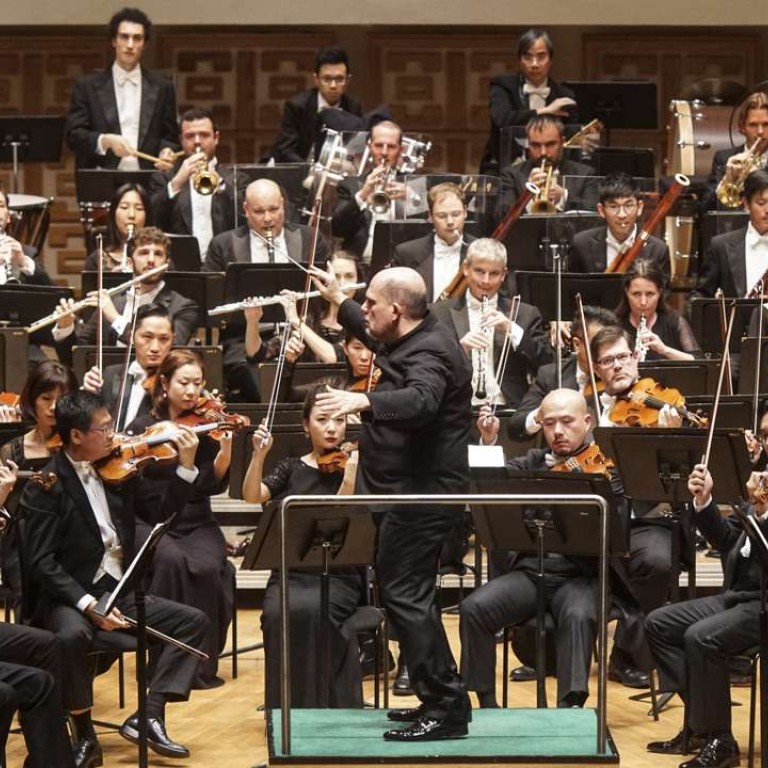
Review: Hong Kong Philharmonic shines in Mahler 3’s forceful and intimate episodes under baton of Jaap van Zweden
Orchestra showed itself up to the challenges of monumental six-movement symphony from the opening bars, and produced a performance of emotion and precision lit up by some wonderful solo playing
“Mahler’s Mighty Third”, the title of this Hong Kong Philharmonic Orchestra concert, hardly seemed an appropriate description of the Austrian composer’s Symphony No. 3, despite the large symphonic forces employed: two harps, two sets of timpani, children’s choir, female choir, eight horns, four trombones, tuba, an offstage post horn, the usual Romantic-era complement of strings, and 17 woodwinds; at one point Mahler deploys four piccolos.
A typical performance comes in at 100 minutes and, with its six movements, the work ordinarily occupies an entire concert programme.
The HK Phil’s rendition, under the baton of Jaap van Zweden, ran the gamut of emotions both in chamber-music-like moments and with the orchestra in full voice – from the grand to the understated, from the powerful to the poignant, and from ominous to other-worldly ethereal.
The work is at one level a testament to Mahler’s love of nature, but at its core expresses nobler sentiments about universality. Each movement reflects Mahler’s view of the world and what is around
him.

The orchestra showed itself to be up to the challenges of the work right from the opening bars. The captivating unison horn theme heralding summer was delivered in wonderful synchronicity and transported listeners to the Austrian Alps, where Mahler penned the work over the course of three summers.
Highlights included the diversity of tone colours and a wonderfully controlled trombone solo from Jarod Vermette, although the excessive use of vibrato at the ends of phrases detracted from the solemnity of the march theme.
Mahler’s use of orchestral players in chamber music episodes is most evident in the middle movements. The second and third movements – which in Mahler’s original programmatic descriptions, later discarded, were called What the Flowers in the Meadow Tell Me and What the Beasts in the Forest Tell Me – are more intimate than the 35-minute opening movement. Typical Mahlerian colour appears here: muted horns, triangle rattles, punctuating pizzicati and even a somewhat surprising rim-shot roll on the bass drum. Thomas Rolfs’ offstage post horn solo was remarkably controlled, sounding distant yet filling the auditorium.
If one was in any doubt as to the philosophical nature of the symphony, the fourth movement makes it abundantly clear, with its setting for alto (sung here by the mezzo soprano Kelley O’Connor) of the “Midnight Song” from Nietzsche’s Also Sprach Zarathustra. Its most moving lines, Weh spricht: Vergeh! Doch all’ Lust will Ewigkeit (Pain says: Pass away! Desire longs for eternity) lead the listener into the fifth movement (which Mahler originally called What the Angels Tell Me). O’Connor delivered a powerfully focused message of what Man needs to heed.

The fifth movement was the only real disappointment. The children’s choir in particular failed to fully complement its clanging bells and deliver the brightness of tone that befits the text.
In the final movement the music is almost perpetual, its message that love is the ultimate example of universality; an exquisite flute solo by Megan Sterling offered a ray of contrast to the opening theme in the lower strings.
Mahler’s Mighty Third, Hong Kong Philharmonic Orchestra/Jaap van Zweden, Hong Kong Cultural Centre Concert Hall. Reviewed: December 9
